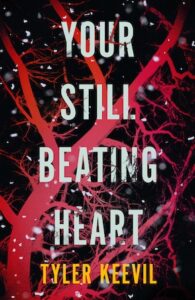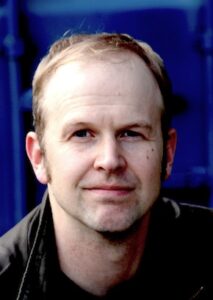An ending
by Tyler Keevil
“The excitement builds until it reaches a climax of almost mythic ferocity and power.” Richard Francis
So, this is how your husband dies: not forty years from now, coughing, wilting, consumed from within by cancer, holding your hand, looking into your eyes, the irises reflecting a lifetime of companionship. Not twenty years from now, after the kids that you haven’t yet had grow up and leave home and no longer need him, and you don’t either – at least, not as much. Not ten years from now, around the time you expect him to have a midlife crisis and buy a Ford convertible, start flirting ineptly and inappropriately with the staff in coffee shops.
No – your husband doesn’t die in any of those ways, but now, tonight, on a slow, cold, rainy Thursday at the end of November, when he’s twenty-nine years old.
He dies in London, a city he never liked, and very far from home.
He dies on a bus, of all places, at ten-thirty-four p.m.
He dies because he loves you. He dies because he’s brave, or maybe insecure – sometimes it’s hard to tell. He dies because he doesn’t want to see you hurt, or scared. He dies because he’s stupid. He dies because he doesn’t think. He dies because he believes it’s his job to protect you. He dies because maybe you believe this too, and expect it of him.
You don’t know why he dies.
You know the how, but not the why.
This is the how: after a film, at the cinema. Tod didn’t particularly want to go (he’d spent the afternoon teaching Tolstoy to hungover first years), but he could tell you did, and so he had a cup of coffee and you caught the tube down to Trafalgar Square. A thirty-one-minute trip. The film turns out to be a British kitchen-sink drama, as dreary as the weather. Tod’s going to be polite about it, but you can feel his scepticism, his resistance to it: the shifting in his seat, the moving of his elbow on and off the armrest.
Then the rolling of credits, the filtering of audience members towards the exit, all of them glum, listless, their faces drawn and grey from the glare of the projector, like extras in the film that’s just ended. Outside, there’s construction at the entrance to the Tube. But a bus is coming, looming large, streaked with rain and grime: should we take the bus? His idea. You trot together across the street, the headlights of passing cars carving funnels through the rain. A big puddle by the curb. He jumps over first, stops to extend his hand to you, which you take, not because you need it but out of the same courtesy that made him offer.
Other passengers look down, away, in that instinctive manner. Avoiding eye contact. But you don’t. Later, you’ll wonder why.”
Inside the bus, the heat is up, the windows are steamed, the aisle is slick with rain dripping off passengers’ coats and boots. You can’t see the city beyond the glass, just a rapid blur of darkness and light. Something about running in the rain, the cold, the impulsive movement, has loosened you both up. The gloom of the cinema has fallen away like a cloak. The two of you talk about the movie like you might have when you first met, rather than simply viewing it together and digesting it separately, agreeing to disagree. Instead, the chat is animated, with you stubbornly defending the film, and him trying to convince you what was wrong with it, with the whole genre – the lack of structure, the dismal stoicism, the working-class stereotype underdog. If he’s talking too loudly, you don’t notice. If he’s coming across as ‘American’ – loud, brash, knowing, confident – it’s almost a relief, a release. This is what he is, or once was. Your American husband with his American name. Tod. Before living in Britain made him small.
You’ll remember thinking: Tod looks good. He looks happy.
And then, the shouting: ‘Shut up, shut up!’
There’s a man at the front end of the bus. It’s unclear who he’s talking to, if anybody. But he’s up now, out of his seat. A pale, wired, skin-headed man. Dressed in a hoody, torn jeans.
‘Shut the hell up,’ he says again. He’s glaring around, skittishly.
Other passengers look down, away, in that instinctive manner. Avoiding eye contact. But you don’t. Later, you’ll wonder why. The man spots you, fixates on you, begins to advance, coming down the aisle, repeating it like a mantra: shut up, shut the hell up, shut up. Then you do look away, at the window next to you, but it’s too late: you can still see him reflected in the foggy glass, his features distorted, his face strange and twisted.
And then he is there, by you, over you. Shouting down at you. ‘Shut the hell up, you stupid bitch.’ And you feel flecks of his spit on your hair, your scalp. Like he’s frothing at the mouth, rabid.
And that’s when Tod, your husband, stands up. He’s smiling, in that uncomfortable way he does when he’s nervous. He’s nervous. He holds up his hands, palms out, like you would to placate a wild dog. ‘All right, man,’ he says, ‘take it easy, okay?’
The man takes a step back, surprised (he hadn’t connected the two of you) and for a moment seems confused, dazed. Then his eyes refocus. On Tod.
‘What the hell are you going to do, mate?’ he says. ‘I’ll mess you up.’
Tod laughs, shakes his head. ‘Buddy, we don’t want any trouble.’
The man has his hands in the pouch of his hoody. You notice this. You don’t think Tod has noticed. You want to tell him, ‘Don’t, Tod. Don’t.’ You want to tell him to let it go, sit down. But you’re afraid to say anything. You’re afraid to move, to breathe. Frozen fear. Later, you will detest this reaction. You’ll wonder about all the things you could have said, or done, to divert the outcome to anything else.
‘Just leave her alone,’ Tod is saying. ‘Just back off, okay?’
The guy looks from him to you, as if he can visibly see the relationship between you, the bond. It seems to anger him. He spits in your direction, deliberately this time – a gob that hits your cheek. Hot, wet, rank. And Tod reaches for him, grabs him, and they are both shouting at each other, and other people are moving, getting out of the way. There is no space to fight, in the aisle of a bus. It is awkward and clumsy and almost juvenile. Tod is much bigger than the man and overpowers him. The air is hot, snapping with a kind of violent energy. You never thought of Tod as strong, physically strong, until then. Not in that way. He pins the man with a forearm and punches down at him, into his face. Tod is not swearing but focused and intent, furious.
Tod sits back abruptly, as if he has decided the fight is finished. He has won. The man slithers out from under him, begins to crawl away, getting to his feet, staggering. Down the aisle, down the stairs. A banging noise, as he smashes at the doors. He either forces them open or the bus driver prudently opens them for him, setting the man loose.
All those faces in the aisle, peering towards you and Tod. Tod is still sitting there. He is looking down. That’s when you see the handle. You don’t even know it’s a knife, at first. It is just this handle, black, gleaming, protruding from his chest. He is cupping his hands around it, as if afraid to touch it, as if afraid touching it will make it real, will make happen what has already happened.
There is blood now, soaking through his T-shirt. So dark, staining the white cotton like blotting paper. His T-shirt has the image of a Mustang on it, and the word Medusa. A movie car. You’ve always liked it, liked him in it. A macho car, but a strong woman – the creature who can turn people to stone. Tod now looks as if he’s turning to stone, solidifying. You’re kneeling by him, saying his name, pressing your palm to the bloody T-shirt. You don’t pull out the knife. You know you’re not supposed to do that. You shout for help. You tell somebody to get out their fucking phone. Actually, several people already have their phones out – filming your panic. Others are yelling, having seen the blood. Maybe one of them calls for help. One of them must.
A woman kneels down opposite, but doesn’t know what to do either. Tod is looking at you, helplessly. All the breath knocked out of his lungs, punctured, emptying. A slow burble of pink froth at his lips. No last words. No ‘I love you’. No apologies. No regrets. No movie moments. But at the end – seemingly aware – he takes hold of your hand, both of you slippery with blood now, and grips it fiercely. So hot. The heat of his life pumping between you, squeezed between your palms. And then the slow stopping, the relaxation, the glazing of the eyes.
By the time you let go, by the time they make you let go, his fingers have gone cold. Just a matter of minutes. You are guided off the bus, into the rain. A blanket, draped over your shoulders. Your hand is still ripe with his blood. You are still cupping your palm as if it is holding his. You can still feel it tingling with the pressure of his grip. You are not crying. People are around you, holding up more camera phones, taking pictures, recording. Some clips will be played on the news, others will creep on to YouTube. You can go back to this moment at any time, forever. The sound of rain, the smell of the dirty city: smoke diesel rain sweat hate fear. These things will always remind you of this night, here, when the man you loved was stabbed in the heart and died and went still and cold and some part of you went cold too, like a bit of that blade had stabbed through him into you. A shard of ice, a fleck of death. It will prove vital for all that lies ahead of you.
From Your Still Beating Heart (Myriad Editions, £12.99)
 Tyler Keevil is the author of three novels, including The Drive (Myriad Editions) and No Good Brother (Borough Press). He has received numerous awards, including the Wales Book of the Year People’s Prize and the Writers’ Trust of Canada/McClelland & Stewart Journey Prize. He is Director of the MA in Creative Writing at Cardiff University. He grew up in Vancouver and moved to Wales in his twenties, and now lives in Abergavenny. Your Still Beating Heart is published by Myriad Editions in hardback and eBook.
Tyler Keevil is the author of three novels, including The Drive (Myriad Editions) and No Good Brother (Borough Press). He has received numerous awards, including the Wales Book of the Year People’s Prize and the Writers’ Trust of Canada/McClelland & Stewart Journey Prize. He is Director of the MA in Creative Writing at Cardiff University. He grew up in Vancouver and moved to Wales in his twenties, and now lives in Abergavenny. Your Still Beating Heart is published by Myriad Editions in hardback and eBook.
Read more
tylerkeevil.com
@TylerKeevil
@MyriadEditions
Author portrait © Naomi Doyle


